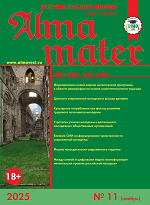Gulnara F. Gali, Cand. Sci. (Pedagogy), Associate Professor of the Department of Foreign Languages, Kazan Federal University, e-mail: gulnaragali@mail.ru
Leona L. Grigoryeva, Cand. Sci. (Philology), Associate Professor of the Department of Foreign Languages, Kazan Federal University
Introduction. The article presents a study of the role of the pedagogical environment and the family in overcoming the problems and difficulties gifted children face in learning and development. The article is devoted to the study of factors influencing the successful development of the intellect and creative individuality of a gifted child. The purpose of this study is to determine the functions of teachers and parents in the development of a gifted child, to identify the conditions for their close cooperation in the formation of favorable opportunities for the development of children’s giftedness.
Materials and Methods. The methodological basis of the research is a systematic approach, theoretical and empirical research methods. To collect empirical data, two questionnaire surveys were conducted, in which 95 parents of students in grades 1st–2nd of the gymnasium participated. For theoretical analysis, a methodological approach was used for a thorough analysis of scientific sources and literature in the field of developing the intellectual and creative abilities of gifted students.
Results. The study identified the problems and barriers that gifted students experience as a result of their exceptional abilities. The professional and personal qualities of teachers necessary for working with gifted children are considered. The activities that are important to carry out with parents for a favorable and effective interaction with children are identified. The qualities that parents must possess in order to contribute to the development of their child’s creative abilities are noted. The pedagogical conditions that ensure the effectiveness of preparing parents for interaction with a gifted child are analyzed.
In the course of the study, a questionnaire survey of parents was conducted to determine the general giftedness of their children.
Conclusions. The results of the study allow us to conclude that there is a need for close cooperation of all participants in the pedagogical process (teachers, psychologists, parents) in order to develop the intellectual abilities of gifted children and provide qualified assistance in overcoming difficulties in learning, development and adaptation in society.
Keywords: children’s giftedness, analysis, interaction with a child, teachers, parents, difficulties, family climate
References
1. Belova, E.S. Child-parent relationships in a family with a gifted preschooler. URL: https://cyberleninka.ru/article/n/detsko-roditelskie-otnosheniya-v-semie-s-odarennym-doshkolnikom/viewer (accessed on: 20.03.2024).
2. Bobrova, I.A., Chursinova, O.V. Family as a developing environment for a gifted child. URL: http://www.rusnauka.com/29_NIOXXI_2012/Psihologia/8_117847.doc.htm (accessed on: 18.03.2024).
3. Gali, G.F. The complex nature of giftedness: foreign experience. Kazan: Kazan University, 2016. 120 p. URL: https://repository.kpfu.ru/?p_id=129856# (accessed on: 18.03.2024).
4. Grushetskaya, I.N., Shcherbinina, O.S. Interaction of gifted schoolchildren with microsociety as a condition for their social development. Prospects of science and education. 2018. Vol. 5 (35). P. 136–144. DOI: 10.32744/pse.2018.5.15
5. Danilova, O.A., Kondratieva, I.G. Self-education of students: a historical aspect. Vestnik NCBZhD, 2019, Vol. 2 (40). P. 19–26. URL: https://www.elibrary.ru/item.asp?id=38186200 (accessed on: 18.03.2024).
6. Zabara, I.V. Features of manifestation of intrapersonal conflicts in gifted children. Internauka. 2016. Vol. 2-1 (2). P. 51–52. URL: https://www.elibrary.ru/item.asp?id=27809151 (accessed on: 18.03.2024).
7. Zaitseva, O.A. Pedagogical support for parents of gifted children. Modern educational environment: theory and practice. Proceedings of the V International Scientific and Practical Conference. 2019. P. 40–43. URL: https://www.elibrary.ru/item.asp?id=37615117 (accessed on: 18.03.2024).
8. Zdorik, A.S. Pedagogical personnel as a criterion for assessing the quality of education of gifted children. Innovations. The science. Education. 2020. Vol. 21. P. 100–105. URL: https://www.elibrary.ru/item.asp?id=44282134
9. Nurbalina, G.K. Practical advice to parents of gifted children. URL: https://www.den-za-dnem.ru/page.php?article=1025 (accessed on: 10.03.2024).
10. Ochertsova, L.I., Vorobieva, L.N. Work with gifted children at school (work experience). Vestnik of scientific conferences. 2021. Vol. 31 (67). P. 105–106. URL: https://www.elibrary.ru/item.asp?id=45770020
11. Ratne, F.L. Quality of Education: Pedagogical Aspect. Higher Education in Russia. 2019. Vol. 28 (12). P. 87–96. https://doi.org/10.31992/0869-3617-2019-28-12-87-96
12. Savenkov, A.I. Your Child is Talented: Childhood Giftedness and Homeschooling. Yaroslavl: Academy of Development Press, 2002. 352 p.
13. Tupikina, Ya.M. Features of education of gifted children of preschool age. (In Rus.) URL: https://urok.1sept.ru/articles/676667 (accessed on: 10.03.2024).
14. Denise A., Soares, Judith R., Harrison, Kristine, Melloy, Alyssa, Baran, Morgan, Mohimann. Practice-to-research: responding to the complexities of inclusion for students with emotional and behavioral disorders with recommendations for school. NAASP Bulletin. 2022. Vol. 106 (2). P. 77–108. https://doi.org/10.1177/01926365221097434
15. Gali, G.F, Fakhrutdinova, A.V, Grevtsova, G.Y, Gali, A.I. The cooperation between family and school as an important aspect in the development of gifted children. Humanities and Social Sciences Reviews. 2019. Vol. 7 (4). P. 422–426. https://doi.org/10.18510/hssr.2019.7457
16. Sepideh Yazdani, Golrokh Daryei. Parenting styles and psychosocial adjustment of gifted and normal adolescents. PACIFIC Science Review B: Humanities and Social Sciences. 2016. Vol. 2 (3). P. 100–105. https://doi.org/10.1016/j.psrb.2016.09.019
17. Tessa Weyns, Franzis Preckel, Karine Verchueren. Teachers–in-training perceptions of gifted children’s characteristics and teacher-child interactions: an experimental study. Teaching and Teacher Education. 2021. Vol. 97. Art. 103215. https://doi.org/10.1016/j.tate.2020.103215











.png)






